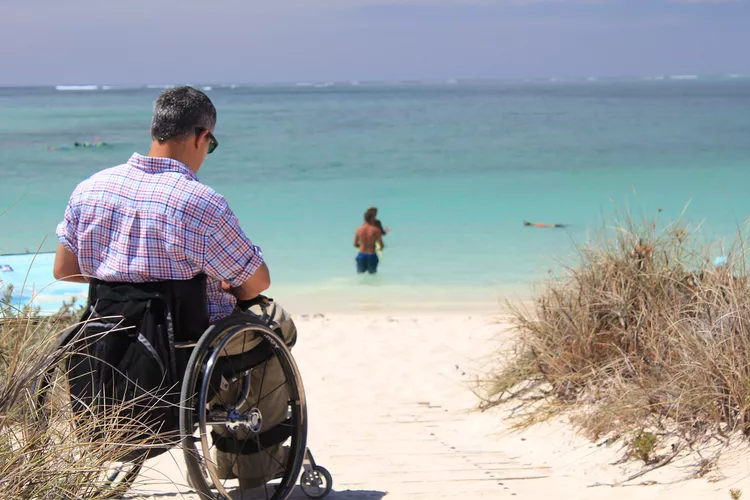Summary
The Caribbean is one of the most popular vacation destinations in the world for disabled travelers; however, not all Caribbean islands are created equal when it comes to accommodating visitors who are handicapped, in a wheelchair, or have limited mobility. Here are some tips for planning an accessible Caribbean vacation that is both enjoyable and convenient.
Consider a Cruise
:max_bytes(150000):strip_icc():format(webp)/cruise-ship-sailing-in-sea-against-clear-sky-1032628856-637439506a0242c9b1ad6778a3b4870e.jpg)
Cruising is one of the most disability-friendly ways to travel, and most cruise lines have made special accommodations for handicapped and mobility-limited passengers. Moreover, U.S. law requires cruise ships operating in U.S. waters to comply with the ADA.
When selecting a cruise itinerary, it is beneficial to look for port calls with docks that can accommodate large cruise ships since tendering from the ship to shore can present challenges for some disabled travelers. Consequently, some cruise lines offer special accessible tour packages.
Choose a Disability Friendly Island
:max_bytes(150000):strip_icc():format(webp)/beach-with-access-for-disabled-people-922663294-de2a0e4603864aa2921b15090fab9782.jpg)
Puerto Rico and the U.S. Virgin Islands are ideal Caribbean destinations for travelers with mobility restrictions or in wheelchairs. Since these islands are part of the United States, hotels here must comply with the Americans with Disabilities Act (ADA), ensuring facilities such as wheelchair ramps, elevators, and accessible bathrooms.
Additionally, Puerto Rico is home to the Sea Without Barriers at Luquillo Beach, an ADA-compliant facility that includes a paved path leading to a semi-submerged platform that allows people in wheelchairs to experience the warm waters. Special water-access wheelchairs can be rented, and the beach is equipped with accessible bathrooms, showers, and other amenities.
Other friendly Caribbean islands for accessibility include Barbados, which has launched its island-wide Fully Accessible Barbados initiative, along with Aruba, Jamaica, and St. Martin.
Mind the Details on Air Travel
:max_bytes(150000):strip_icc():format(webp)/wing-of-an-aeroplane-at-sunset--988555126-c223a36cae044680981465a2a65d5897.jpg)
While most U.S. airports feature wheelchair-friendly jetways, this is not always the case in the Caribbean. At many smaller island airports, passengers may need to exit the aircraft via stairs, which creates evident challenges for travelers with disabilities.
Moreover, shorter flights between islands often utilize small aircraft that may not accommodate wheelchairs. Therefore, if you are flying to a smaller airport, ensure you research the facilities prior to your journey. The Society for Accessible Travel and Hospitality provides links to airline accessibility policies online.
Ensure that Quality Emergency Health Services are Available
:max_bytes(150000):strip_icc():format(webp)/female-doctor-consoling-woman-while-holding-tablet-computer-in-medical-examination-room-961285698-f876b8235b0c4255b8f3e4b0ae255f18.jpg)
First, it is critical to acquire travel health insurance that includes coverage for emergency medical evacuation when needed. In the Caribbean, healthcare quality varies significantly across islands, resulting in a stark contrast between services provided in private clinics versus public hospitals.
Many smaller islands may not have a hospital or clinic available—some even lack a doctor. The U.S. State Department’s Bureau of Consular Affairs provides important healthcare information on Caribbean destinations, as do resources from organizations like the Centers for Disease Control and Prevention.
Consult an Accessible Travel Specialist
:max_bytes(150000):strip_icc():format(webp)/man-and-woman-in-travel-agent-imsis089-018-7fc08f8785a4400fb9faec112ca9dad4.jpg)
The travel agent industry has become increasingly specialized, with many agents focusing on planning trips for travelers with disabilities. Agencies like AbletoTravel, Connie George Travel, and Special Needs at Sea specialize in catering to the needs of special-needs travelers. Furthermore, websites like Disabledtravelers.com and Access-able Travel provide access to various specialized agents.
Check Out Your Hotel Before You Travel
:max_bytes(150000):strip_icc():format(webp)/tropical-sandy-beach-with-disabled-access-at-a-hotel-resort-881835120-fcf4d1219e944c3fb15e83b311d19ea1.jpg)
International hotel chains with ties to the U.S. often provide the best assurance for ADA compliance while traveling in the Caribbean. However, many hotels in the region lack elevators or are situated in rough terrain, complicating wheelchair access.
Conversely, hotels like the Amaryllis Beach Resort in Barbados have been specifically designed to be ADA compliant and accessible. Therefore, it is essential to ensure that your hotel meets your accessibility needs before traveling. Online resource centers for disabled travelers often include databases of hotels worldwide that are accessible, aiding in your preparations.




